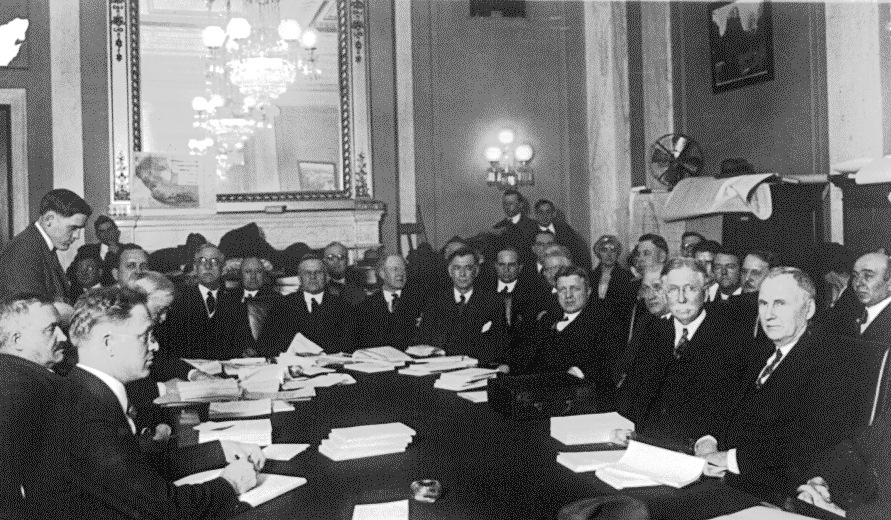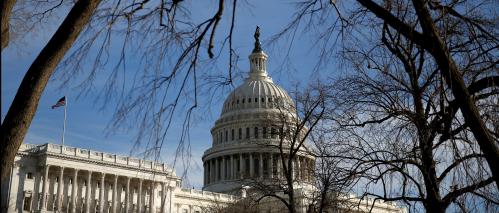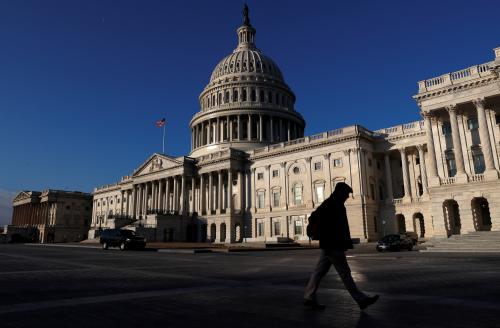 When Democrats take over the House of Representatives they will have to strike a balance between legislation and investigation. As much as some are advising Democrats to build a legislative record, Democrats will also find themselves faced with the need to take up multiple investigations. And so it makes sense to have a look at Congress’s investigatory power and history.
When Democrats take over the House of Representatives they will have to strike a balance between legislation and investigation. As much as some are advising Democrats to build a legislative record, Democrats will also find themselves faced with the need to take up multiple investigations. And so it makes sense to have a look at Congress’s investigatory power and history.
A good place to begin is with a new book by Elise J. Bean, Financial Exposure: Carl Levin’s Senate Investigations into Finance and Tax Abuse. Bean is an attorney who joined the U.S. Senate Permanent Subcommittee on Investigations (known as PSI) in 1985 and worked for Senator Carl Levin (D-Mich.) until he retired in 2015. She has written a timely history of congressional investigations.
Congress’s power to investigate is very broad. It stems from Article 1, Section 8 of the Constitution which gives Congress the power to “make all Laws which shall be necessary and proper for carrying into Execution the foregoing Powers.” In the early 1920s a Supreme Court case that grew out of the Teapot Dome scandals upheld Congress’s investigatory powers even though these were never explicitly spelled out in the text. The court case also upheld Congress’s right to subpoena witnesses and enforce those subpoenas. But perhaps most importantly the courts have given Congress an even broader scope of investigation than that of the judiciary. Bean pulls the following quote from a 1938 case that spells this out:
“A legislative inquiry may be as broad, as searching, and as exhaustive as is necessary to make effective the constitutional powers of Congress… A judicial inquiry relates to a case….A legislative inquiry anticipates all possible cases which may arise thereunder…” [Townsend v. United States, 95 F.2d 352, 361 (D.C. Cir)]
Congressional investigations have shaped large parts of American history, often drawing intense public scrutiny and/or resulting in major legislation. Here are some of the bigger investigations.
- The House investigates Wall Street Banks in the Pujo Committee Hearings of 1912-1913. According to Bean, Congressman Arsene Pujo (D-La.) “exposed how a handful of major Wall Street Banks had acquired control over vast commercial enterprises” (Bean, p.4).
![The Pujo Committee, pictured in 1912. [Credit: Library of Congress]](https://www.brookings.edu/wp-content/uploads/2019/01/pujo-committee.jpg?quality=75&w=1024)
- The Senate investigates the Teapot Dome Scandal, 1922-24. As a result of this inquiry, Interior Secretary Albert Fall was the first former Cabinet officer to go to jail because of crimes committed while in office, and Senator Thomas Walsh (D-Mont.) became a national hero.

The Senate investigates the role banks played in the 1929 stock market crash in the Pecora hearings. Ferdinand Pecora was hired by Senator Peter Norbeck (R-S.D.). He subpoenaed big-shot bankers and subjected them to intense grilling about their role in the stock market crash that began the Great Depression and in so doing captivated the nation. He made front page headlines, and the investigations resulted not only in many new laws regulating the stock market but in a new word “Banksters” used to describe the men who had caused the crash.

- The McCarthy Hearings (1950-1954) were named for Senator Joseph McCarthy (R-Wisc.) and were a relentless, over-the-top effort to weed communists and socialists out of the government. They took place at the beginning of the television era and mesmerized the public. The McCarthy hearings are a black spot in the history of congressional hearings. Eventually, after years of controversy they ended with the Senate stripping the committee of its powers and censuring Senator McCarthy. Have a look at what is commonly understood to be the turning point in those hearings—when Joseph Welch, counsel for the U.S. Army, countered the Senator with his famous line “Have you no sense of decency sir?”
- The Watergate Hearings 1973-1974) investigated Richard Nixon’s 1972 election campaign and were triggered by the break-in at the Democratic National Committee headquarters at the Watergate in June of 1972. Like the McCarthy hearings, they were televised and held the attention of a fascinated public. They resulted in the resignation of President Richard Nixon just ahead of impeachment votes in the House and conviction in the Senate. The hearings also led to several new laws governing campaign finance. Here’s a famous clip of White House Counsel John Dean – who eventually blew the whistle on Nixon’s law breaking – testifying before Senator Sam Ervin (D-N.C.) who headed the investigation.
- These hearings and many less-well-known ones, have shaped American history and taken down powerful people from bankers and titans of industry to Presidents. Congress may yet have to do this again.







Commentary
Congress in 2019: A brief history of congressional investigations
January 2, 2019